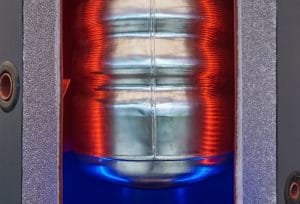 The trend toward greater environmental friendliness has grown stronger over the years in most industries. However, defining what it means can be different according to any given application. Consumers demand greater eco-friendliness as they call for companies to implement greener and more environmentally conscious practices. Evolving regulations also make the trend mandatory for companies in most industries to follow, providing guidelines for making everyday processes much more eco-friendly. In many applications, streamlining electrical thermal management is an important first step in creating more eco-friendly processes. (more…)
The trend toward greater environmental friendliness has grown stronger over the years in most industries. However, defining what it means can be different according to any given application. Consumers demand greater eco-friendliness as they call for companies to implement greener and more environmentally conscious practices. Evolving regulations also make the trend mandatory for companies in most industries to follow, providing guidelines for making everyday processes much more eco-friendly. In many applications, streamlining electrical thermal management is an important first step in creating more eco-friendly processes. (more…)
Advanced Electrical Cooling in Today’s Modern Industries
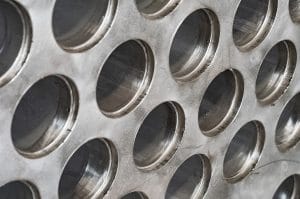 Technological advancement has touched every aspect of modern life, but some of the more impactful advancements have taken shape in the way companies in nearly every industry now operate. From automating large-scale manufacturing processes to boosting efficiency and productivity to levels never seen before, modern industries have taken significant leaps forward thanks to advanced technologies of many different forms. One of the most significant areas of improvement has been in the realm of electrical thermal management and the various processes by which companies keep their technologies properly cooled. More streamlined and efficient electrical cooling processes have helped make the advanced technologies that industries rely on possible. (more…)
Technological advancement has touched every aspect of modern life, but some of the more impactful advancements have taken shape in the way companies in nearly every industry now operate. From automating large-scale manufacturing processes to boosting efficiency and productivity to levels never seen before, modern industries have taken significant leaps forward thanks to advanced technologies of many different forms. One of the most significant areas of improvement has been in the realm of electrical thermal management and the various processes by which companies keep their technologies properly cooled. More streamlined and efficient electrical cooling processes have helped make the advanced technologies that industries rely on possible. (more…)
What Transferring Heat Means for Modern Thermal Management
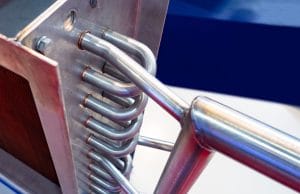 In most modern industries these days, thermal management is an important part of many different essential processes. That include everything from keeping electrical enclosures cooled so that technology can operate efficiently, to managing certain production-centric processes, such as removing heat from molds. In many cases, heat transfer technology such as heat exchangers provide the optimal solution for managing heat in a highly efficient and productive manner. The ability to meet some of the most demanding thermal management challenges with optimal efficiency, and with minimal energy and environmental footprints, have made heat exchangers and their heat transfer techniques a pillar of technological advancement. (more…)
In most modern industries these days, thermal management is an important part of many different essential processes. That include everything from keeping electrical enclosures cooled so that technology can operate efficiently, to managing certain production-centric processes, such as removing heat from molds. In many cases, heat transfer technology such as heat exchangers provide the optimal solution for managing heat in a highly efficient and productive manner. The ability to meet some of the most demanding thermal management challenges with optimal efficiency, and with minimal energy and environmental footprints, have made heat exchangers and their heat transfer techniques a pillar of technological advancement. (more…)
Finding Value in Low-Maintenance Electrical Cooling
 Efficiency wasn’t always an option in electrical thermal management. Not long ago, companies were resigned to the fact that making use of technology meant absorbing its often high costs, especially when it came to keeping that technology cooled. Today, however, efficiency has become one of the most competitive points between different thermal management systems, thanks largely to the advancement of heat exchangers and other customizable thermal solutions. By simplifying the ways in which most technologies approach electrical cooling, heat exchangers have continued to provide several important advantages, including the ability to create low-maintenance solutions for high-performance thermal management. (more…)
Efficiency wasn’t always an option in electrical thermal management. Not long ago, companies were resigned to the fact that making use of technology meant absorbing its often high costs, especially when it came to keeping that technology cooled. Today, however, efficiency has become one of the most competitive points between different thermal management systems, thanks largely to the advancement of heat exchangers and other customizable thermal solutions. By simplifying the ways in which most technologies approach electrical cooling, heat exchangers have continued to provide several important advantages, including the ability to create low-maintenance solutions for high-performance thermal management. (more…)
The Immediate and Long-Term Advantages of Heat Exchangers
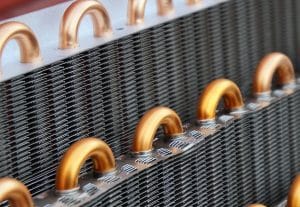 Of the many different ways in which heat exchangers have transformed electrical cooling, the most important is that they work. Companies can rely on the advanced thermal management solutions to effectively and efficiently keep their electrical enclosures cooled. Now, their reliability has helped increasingly more companies enjoy the many benefits of more streamlined electrical cooling. However, the benefits that heat exchangers provide aren’t always immediately obvious, and in many cases, they become much more impactful the longer companies utilize them. That includes highly essential advantages, including reduced energy consumption and a significantly lower environmental footprint. (more…)
Of the many different ways in which heat exchangers have transformed electrical cooling, the most important is that they work. Companies can rely on the advanced thermal management solutions to effectively and efficiently keep their electrical enclosures cooled. Now, their reliability has helped increasingly more companies enjoy the many benefits of more streamlined electrical cooling. However, the benefits that heat exchangers provide aren’t always immediately obvious, and in many cases, they become much more impactful the longer companies utilize them. That includes highly essential advantages, including reduced energy consumption and a significantly lower environmental footprint. (more…)
How Some Industries Use Specialized Heat Exchanger Tech
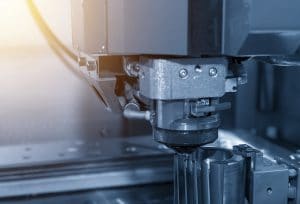 In their basic, conventional forms, heat exchangers are designed specifically to streamline electrical thermal management so companies can eliminate many of the burdens that come with it. For example, heat exchangers can consistently keep electrical enclosures properly cooled while using a significantly lower amount of energy, and the cooling units don’t need to be frequently maintained or fixed due to malfunction. However, many of today’s various thermal management processes have also benefited from specialized forms of heat exchanger technology, which are designed to address less common thermal management needs. (more…)
In their basic, conventional forms, heat exchangers are designed specifically to streamline electrical thermal management so companies can eliminate many of the burdens that come with it. For example, heat exchangers can consistently keep electrical enclosures properly cooled while using a significantly lower amount of energy, and the cooling units don’t need to be frequently maintained or fixed due to malfunction. However, many of today’s various thermal management processes have also benefited from specialized forms of heat exchanger technology, which are designed to address less common thermal management needs. (more…)
Thermal Management Factors that Heat Exchangers Excel At
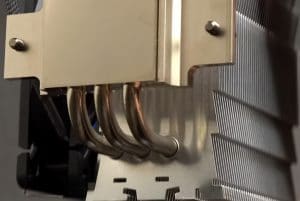 There are many different factors that go into modern, efficient electrical thermal management. The most important of those factors differ for companies in various industries, but in most cases, heat exchangers excel at helping them optimize all of them. From improving the overall quality of companies’ electrical cooling processes to helping them significantly reduce their energy consumption, and much more, heat exchangers have proven invaluable in helping modern industries overcome the most demanding thermal management challenges. (more…)
There are many different factors that go into modern, efficient electrical thermal management. The most important of those factors differ for companies in various industries, but in most cases, heat exchangers excel at helping them optimize all of them. From improving the overall quality of companies’ electrical cooling processes to helping them significantly reduce their energy consumption, and much more, heat exchangers have proven invaluable in helping modern industries overcome the most demanding thermal management challenges. (more…)
How to Simplify Below-Ambient Electrical Cooling
 Over the past several decades, heat exchangers have made a significant impact on the thermal management process of companies in all industries. They’ve done this by giving companies better, more natural, and more efficient was of preventing electrical overheating, which don’t rely on cumbersome processes like condensing and/or chilling air. In many cases, the ambient cooling techniques used by heat exchangers provide more than adequate solutions for keeping most modern applications properly cooled. However, applications that require below-ambient cooling have also benefited just as significantly from the efficient and eco-friendly processes provided by modern heat exchangers. (more…)
Over the past several decades, heat exchangers have made a significant impact on the thermal management process of companies in all industries. They’ve done this by giving companies better, more natural, and more efficient was of preventing electrical overheating, which don’t rely on cumbersome processes like condensing and/or chilling air. In many cases, the ambient cooling techniques used by heat exchangers provide more than adequate solutions for keeping most modern applications properly cooled. However, applications that require below-ambient cooling have also benefited just as significantly from the efficient and eco-friendly processes provided by modern heat exchangers. (more…)
Benefits Heat Exchangers Bring to Different Industries
 In different industries, technology can take on different roles. These days, those roles are increasingly more vital, sometimes taking over entire critical processes. The specific ways in which companies in different industries utilize technology may differ, but maintaining it and ensuring its optimal operation are often similar. For instance, no matter its use, any technology requires an adequate system for electrical thermal management. While there are several different forms of electrical cooling to choose from, heat exchangers have remained the most commonly implemented solutions across all industries for decades, and for several important reasons. (more…)
In different industries, technology can take on different roles. These days, those roles are increasingly more vital, sometimes taking over entire critical processes. The specific ways in which companies in different industries utilize technology may differ, but maintaining it and ensuring its optimal operation are often similar. For instance, no matter its use, any technology requires an adequate system for electrical thermal management. While there are several different forms of electrical cooling to choose from, heat exchangers have remained the most commonly implemented solutions across all industries for decades, and for several important reasons. (more…)
Heat Exchangers and the Modernization of Thermal Management
 The advanced state of today’s technology was made possible by countless innovations, improvements, and iterations of different technological aspects. While each of these aspects has been vital in their own right, one of the most significant advancements has been in the realm of electrical thermal management. This is the process of keeping electrical components and the enclosures they’re housed in properly cooled and preventing the waste heat from causing damage. The ability to achieve electrical cooling in a highly efficient manner, and using increasingly more versatile heat transfer methods, has been crucial to the advancements of most forms of technology. (more…)
The advanced state of today’s technology was made possible by countless innovations, improvements, and iterations of different technological aspects. While each of these aspects has been vital in their own right, one of the most significant advancements has been in the realm of electrical thermal management. This is the process of keeping electrical components and the enclosures they’re housed in properly cooled and preventing the waste heat from causing damage. The ability to achieve electrical cooling in a highly efficient manner, and using increasingly more versatile heat transfer methods, has been crucial to the advancements of most forms of technology. (more…)







